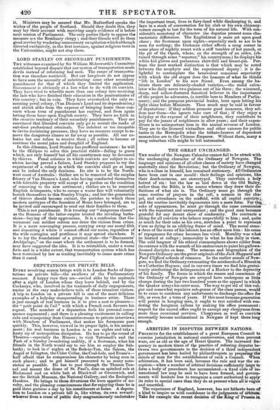THE GREAT UNCHANGED.
THE reader of the Newgate Calendar cannot fail to be struck with the unchanging character of the Ordinary of Newgate. The language and opinions of all other classes of society have changed materially since the Revolution ; but the Ordinary. of Newgate, who is a class in himself, has remained stationary.. All Ordinaries- have been cast in one mould : their feelings and opinions, like.. their death-sermons, are stereotyped. They entertain a holy hatred of sin : but the law as laid down at the Old Bailey, rather than the Bible, is the source whence they draw their de- finitions of what sin is. The Ordinary must go through the same routine of prayers in the cell, a sermon in the cha- pel, and attendance on the scaffold, with all capital convicts;: and the routine inevitably degenerates into a mere form. For that sake of appearances, he must go through .the same ceremonies with the repentant and unrepentant ; and the good man becomes grateful for any decent show of conformity. He contracts a liking for all convicts who behave respectfully to him ; and, quite as much for their sake as his own, stretches a point to represent Viem as dying in an' edifying frame of mind. The moral atmo-' ',there of the scene of his labours has an effect upon him : his sense of repugnance for crime becomes less vivid. Morality was what he learned at college ; immorality is what he has daily in view. The cold languor of his ethical commonplaces shows colder from - its contrast with the warmth of his endeavours to paint his gallows-: doomed disciples en beau. The sermons and biographies of the Newgate Ordinary are the great originals of the Jack Sheppard and Paul Clifford schools of romance. In the earlier annals of New- gate, we find the Ordinary extenuating the misdeeeds of a Blueskin. or a Catherine Haynes; and in our own times we find him gratui- tously attributing the delinquencies of a Hocker to the depravity- of his family. The forms in which the reason and conscience of the Ordinary of Newgate are arrayed have undergone as little change during the last two hundred years as the apparel in which: the Quaker arrays his outer man. The way to get rid of this vul- gar and somewhat repulsive sub-genus of the class parson, would be to cease to condemn any unfortunate to discharge theoflice for life, or even for a term of years. If this most humane generation will persist in hanging men, it ought to rest satisfied with ren- dering the hangman callous by making his office permanent : respect for the sacred office ought to exempt any clergyman from more than occasional services. Clergymen as well as convicts necessarily become acclimatized in Newgate if kept there long; enough.


























 Previous page
Previous page